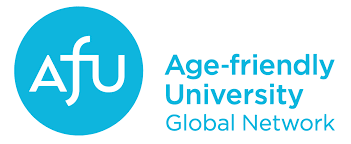Bridging Borders and Generations: Age-Friendly Collaborative Online International Learning
September 29, 2025 Daniel Mansour, Maria Docal Amari, Diane Martin, Marja Airaksinen, Nicole Brandt
An interprofessional global team of students and faculty at UMB and the University of Helsinki worked together to develop an Age-Friendly course using the COIL model.
As the global aging population grows rapidly, the Age-Friendly Movement has emerged to support environments that promote healthy aging (World Health Organization, 2025). Central to this initiative are the 4Ms: What Matters Most, Medication, Mobility, and Mentation (The John A. Hartford Foundation, n.d.). These principles guide care that respects individual priorities, promotes safe medication practices, supports physical mobility, and nurtures cognitive well-being.
Complementing the Age-Friendly Movement is Collaborative Online International Learning (COIL), a model that connects students and educators across countries through virtual collaboration (SUNY COIL Center, n.d.). COIL fosters cross-cultural dialogue and interdisciplinary education, equipping learners to address global challenges, such as aging, by sharing perspectives, exploring systemic differences, and engaging in international teamwork.
In May 2025, a COIL course was developed through a partnership between the University of Maryland, Baltimore (UMB) and the University of Helsinki School of Pharmacy. With support from the Center for Global Engagement at UMB, an interprofessional team of students and faculty from pharmacy, nursing, social work, gerontology, and graduate studies collaborated with community members throughout the preceding year. These engagements shaped the course design and ensured diverse viewpoints were represented. Two teams were formed to develop four modules exploring: (1) health conditions and policies influencing aging, (2) ageism and its societal impact, (3) social determinants and care improvements, and (4) caregiver responsibilities and challenges. Monthly meetings helped refine course content with feedback from both institutions and community partners.
The instructional approach integrates recorded lectures, country-specific readings, reflective writing, cultural case studies (e.g., caregiver burnout), and virtual team projects. Assignments emphasize communication, empathy, and critical thinking. Students gain skills to assess aging-related scenarios through a global lens and propose culturally informed solutions. This learning experience enhances students' understanding of aging and person-centered care, while promoting the development of Age-Friendly Health Systems. Participant feedback highlighted the value of intercultural collaboration and the course’s impact on professional growth.
Key lessons from the course development include the importance of coordinating across time zones, ensuring accessibility of course materials, and fostering open communication among team members. Small-group discussions and shared case studies were effective in promoting thoughtful conversations. A collaborative model where all participants contribute and learn together supports an inclusive and respectful learning environment.
This COIL initiative offers a model that can be adapted across other aging-related disciplines such as medicine, public health, dentistry, audiology, physical therapy, and social work. Although this course focused on aging, the COIL framework is flexible and suitable for various topics. To sustain and expand such programs, ongoing feedback, structured evaluation, and institutional support are essential.
In conclusion, integrating COIL with Age-Friendly principles equips students with the knowledge and cultural sensitivity required to navigate aging-related issues in a globally connected world. By engaging in collaborative learning and person-centered care strategies, learners are better prepared to contribute to dignified, high-quality care for older adults (Murphy et al., 2023).
References
Murphy, S.C., Severance, J.J., Camp, K., Knebl, J.A., Fairchild, T.J., and Soto, I. (2023). Lessons Learned from Age-Friendly, Team-Based Training. Geriatrics, 8(4), 78. https://doi.org/10.3390/geriatrics8040078
SUNY COIL Center. (n.d.). What is COIL? Retrieved April 25, 2025, from https://online.suny.edu/introtocoil/suny-coil-what-is/
The John A. Hartford Foundation. (n.d.). Age-Friendly Care. Retrieved April 25, 2025, from https://www.johnahartford.org/grants-strategy/current-strategies/age-friendly/age-friendly-care
World Health Organization. (2025). Age-friendly Environments. https://www.who.int/teams/social-determinants-of-health/demographic-change-and-healthy-ageing/age-friendly-environments